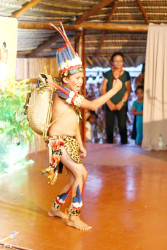President David Granger last evening announced a rescue plan for Guyana’s fading Amerindian languages as Indigenous Heritage Month was launched.
“The rich and diverse culture of our indigenous peoples need to be safeguarded…Today I wish to particularly express my hopes for indigenous languages in this republic,” Granger said in his address to the audience gathered at the Sophia Exhibition Complex.
Later, in his address, Granger announced a plan that would see the revitalisation of the Amerindian Language Project, albeit under a different name, at the University of Guyana.
He explained that one of the project’s objectives would be to see the completion of the compilation of dictionaries of the Carib and Patamona languages. The president explained that this was necessary since of the nine languages spoken by Guyana’s nine Indigenous tribes, only seven were in respective dictionaries.
“Your government will reestablish the Amerindian Language Project at the University of Guyana and henceforth it will no longer be known as the Amerindian Language Project but the Indigenous Language Project. At the forefront of that mission is our emphasis on the preservation of language,” he announced.
Granger said that in keeping with this year’s Heritage Month theme, ‘Preserving our customs and traditions,’ it was important to stress cultural preservation and he added that it was the duty of the populace to ensure that customs and practices of their ancestors be passed down from generation to generation.

at the Sophia Exhibition Complex. (Keno George photo)
“Modernisation and penetration by other cultures are threatening many of the traditions and values that our people hold dear,” he said.
Referring to his tour of the hinterland during the last election campaign, he lamented that while older villagers spoke in tribal tongue and that it required translation, the younger ones of the “BlackBerry generation” were not keen in perpetuating those languages.
“It is, therefore, important that those languages be preserved and practised because for many it is the most efficient means of personal communication… we are all poorer when we are not able to communicate with each other,” he said.
“It is time for that ignorance to end. It is time for Guyanese people to embrace indigenous languages. Your government favours cultural retention and cultural continuity. We respect your identity and heritage and we want to see those languages preserved and propagated. The language of our indigenous people are under threat…the passage of indigenous language from one generation to the next is not proceeding seamlessly,” he added.
At the recent National Toshaos Council meeting, Granger said he proposed a hinterland language and sports commission that will, among other things, be charged with the responsibility for promoting and preserving the indigenous language in accordance with the constitution. The language project will be a priority for the commission. It will also foster programmes to ensure that the cultures and customs flourish and that they are more widely appreciated and respected.
Towards this end, he also announced that students in the indigenous communities would also be taught in their tribal language. “We will ensure that, wherever possible, children in indigenous communities receive a part of their formal instruction in their native languages,” he said.
This earned him the applause of attendees, including former Amerindian Affairs Minister under the past administration Carolyn Rodrigues-Birkett as well as toshaos and Indigenous groups.
The toshaos each brought greetings and/or prayers from their respective villages.
Adam Calistro, whose group was previously banned from speaking at Amerindian Heritage events, expressed gratitude that he once again had a voice to speak of the ills being meted out to his people and he tasked the new administration with addressing their concerns.
One main issue, he said, is demarcation and he pointed to his village, Rabucai in Region 8, which has three sets of boundaries. He added that water pollution and human trafficking also need the attention of the respective authorities.




